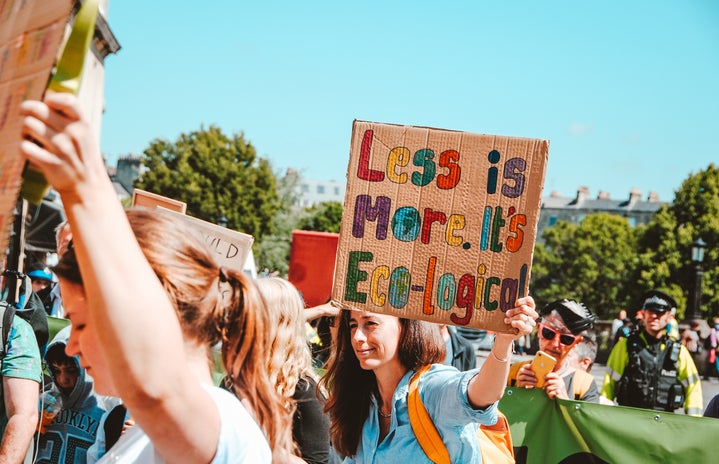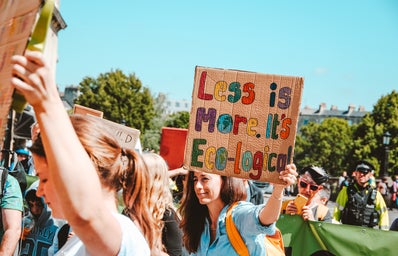Overconsumption. It seems like this word has been thrown around for the past couple of years, usually in conversations regarding the “Stanley Cup craze” or “Sephora 10-year-olds.” I’m sure you’ve heard the term, but do you know what it means? Do you know how overconsumption truly impacts our planet and well-being? Are you unknowingly (or knowingly) contributing to the trend of mainstream overconsumption in the U.S.? Let’s talk about it.
What is Overconsumption?
“Pack my Stanley with me for a walk” has to be the stupidest internet trend I’ve seen in recent years. TikTokers open their cupboards to reveal 10+ REUSABLE Stanley water bottles. (Note: the bottles are REUSABLE for a reason, the whole point is you only need one) They get their ice from circular silicone ice molds so that it fits perfectly into their bottle. They strap a mini backpack to their water bottle and load it with an abundance of unnecessary items that do nothing but waste the consumer’s money and the planet’s resources.
The Population Media Center gives a great definition: “Overconsumption is, simply, individuals consuming more resources than they need and that the Earth can provide. This extreme behavior also prevents the natural renewal of resources due to the speed of consumption. It is particularly a problem in the global North, where the populace tends to have more money available for leisure and convenience.” (Peluso, 2022)
I couldn’t have said it better myself. Many people might think their contributions to overconsumption don’t mean much. However, truly, it comes down to every individual consumer.
How is it Portrayed on Social Media
Reusable water bottles becoming a leading reason for overconsumption has to be a joke from a sitcom. They were popularized so that people could use LESS plastic in single-use water bottles. Buying 20 reusable water bottles and useless “accessories” for them puts us right back in the same situation. My favorite thing is when I watch a TikTok of somebody pouring water from a single-use plastic bottle into their Stanley…what are we even doing guys?
Overconsumption is popularized in every aspect of social media. When creators are constantly marketing products to you, it is hard not to feel compelled to buy them, especially when you have the money to do so. Purchasing trendy products is not at all what I am trying to demonize in this article. Being in on trends is a fun way to feel like you are part of a group. However, purchasing trending products does become an issue when you already have 10 of those products from other brands just lying around collecting dust. Influencers make it seem cool to consume wayyy more goods than you need, but living sustainably is a better option for you and the Earth.
Why is it dangerous?
For some people and groups, abstaining from overconsumption has become almost the same as becoming a vegetarian for non-dietary reasons. “You can stop eating meat, but the general population won’t, so does it even matter?” This mindset that “everybody is doing it, so why should I stop?” is why this cycle continues. Once you break out of that frame of thought and realize that you don’t need all the newest clothes and products to be happy, you’ll find that sustainability makes you feel better than consumer therapy ever could. There are two main things that mass overconsumption impacts the most.
- Planet
Overconsumption harms the planet by significantly contributing to pollution and global warming in two main ways: production and waste.
Mass-produced products are often made in non-sustainable factories that use an abundance of resources such as water and plastics to make low-quality items that are not intended to last. The very production of these items is harmful to the environment.
When these products are no longer “trendy,” they end up in a landfill somewhere only polluting our environment. We may not feel the first-hand effects of product and textile waste in America because much of our waste is shipped to other countries and often thrown in the ocean. Chile has one of the largest landfills in the world – it can be seen from space.
- Well-being
Falling into a cycle of overconsumption impacts our self-worth. It can be deeply problematic for your self-image if retail therapy is what you turn to to make yourself feel confident or happy. You will only fall deeper into the trap that is overconsumption unless you stop while you’re ahead. Changing priorities is a large part of combatting overconsumption.
How to not fall victim
There are steps you can take to be a smart consumer and not fall victim to the overconsumption trends. This is my rule of thumb:
- Identify the product you want.
- Do you already have it in some different form?
Yes: hold back, wait for the product you already have to run out/you cannot use it anymore and then buy the trending one after. If the original trend is over by the time the product you already have is done, well now you get to buy the NEWEST trending product! Yay, you!
No: go ahead and buy it if you think it will be a good investment and last you a while. If it is a frivolous item that you think won’t be used or enjoyed after you purchase it, really think about whether or not you need it before you buy it. There is no need to spend needlessly on things that will only end up in a landfill one day. Remember: if YOU don’t buy it, that is one less product that needs to be replaced. Every individual purchase counts.
Final Thoughts
In saying all this, of course, we all need and want new things sometimes. I am in no way making it seem like people who want to buy new things are evil, regular consumption is one thing, and over-consumption is another. I can’t say I am not, and will not ever be guilty of buying unsustainable items that I don’t need. However, the least a person can do is be conscious of their consumerism. I hope everybody takes an inward look at their consumer habits and every time you go shopping or press that “checkout” button on your laptop, think about the bigger picture of how each person impacts the planet.


